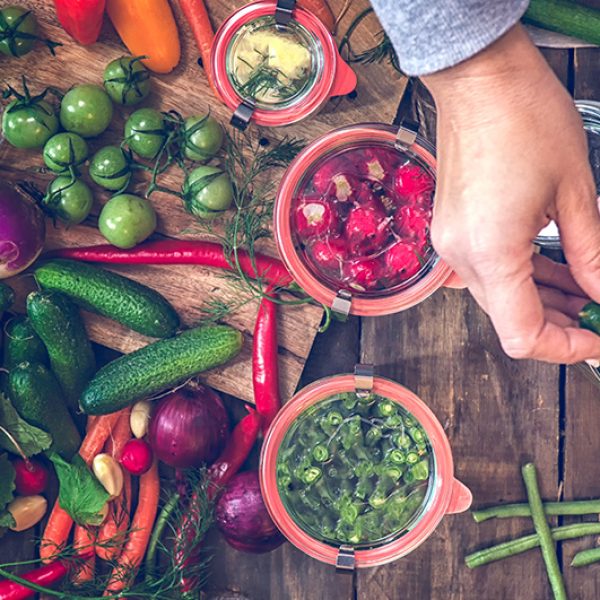

Are fermented foods for you?
Fermented food is not food that has gone bad – it is food that has gone… well, improved! When a healthy food is fermented, microbes magically transform it into something even more tasty and nutritious! Read on to learn more.
Why Do I Want to Eat Microbes, Again?
When a food is fermented, helpful microbes change the composition of the food, forming more nutrients and making others more bioavailable. As a bonus, the helpful microbes that fermented the food act as probiotics in your gut! Probiotics are one of the most exciting areas of nutritional research these days: studied benefits range from digestive health and mood, to inflammation and energy.
Tummy Troubles
Why do some folks claim fermented foods improve their digestive health? A healthy gut contains enough probiotics to keep bad microbes (cause gas and irritation) at bay. But, stress (physical and mental), travel, pharmaceutical drug use, and poor food habits can cause probiotics to decline in the gut. As such, many Canadians are aware of the tummy troubles that come with this microbial imbalance, called dysbiosis. Eating fermented foods can give your gut a probiotic boost. It is important to note that the amount and types of probiotics in a fermented food will vary from batch to batch, as well as over time. If clinical results are desired, higher dosages of specific probiotics are likely needed.
Moody Microbial
Your brain and gut love to chat – they greatly influence each other’s mood. When your gut is hosting too many bad microbes, it can lead to anxiety and depression. Don’t fret – studies show both symptoms can be reversed by increasing certain probiotic levels in the gut.
Thinking Long-Term
Eating a probiotic-rich diet may be a good way to keep your brain young. In the Hisayama Study, 1006 adults were followed for 15 years, and those who ate a balanced diet (including algae, vegetables, soya bean and dairy products, including fermented) had a lower risk of dementia. Think about digging into some tempeh, too! Tempeh is a fermented soy product popular in Indonesia, that research links to better memory in older adults. As for the future, fermented papaya may deserve more than a passing thought – early studies suggest fermented papaya could reverse memory troubles.
Fermented Foods Around the World
Despite recent excitement, we have been eating fermented foods for centuries: tofu in Japan, doogh in the Middle East, filmjölk in Nordic countries, kimchi in Korea, and lassi in India. In fact, even India’s Dietary Guidelines encourage the consumption of fermented foods, noting they have enhanced digestibility and nutritional value (particularly vitamins B and C).
What’s Next?
Fermented foods may not be the only way we can get probiotics onto our dinner table. Students at the University of Singapore are currently working on a process to create probiotic beer, and food companies are creating probiotic-containing novelties from granola bars to brownie mixes!
Famous Fermented Foods around the World:
Amazake – a sweet Japanese drink made from fermented rice.
Atchara – pickled papaya popular in the Philippines.
Doogh – a yogurt-based drink with various names around the Middle East.
Filmjölk – a creamy drink made from fermented cow’s milk in Nordic countries.
Idli – savory rice cakes made with fermented black lentils in India and Malaysia.
Kefir – a drink made with milk and kefir grains traditional to areas around Russia.
Kimchi – a traditional side-dish of fermented vegetables popular in Korea.
Kombucha – an Asian effervescent tea fermented by a symbiotic culture of bacteria and yeast.
Lassi – a yogurt-based drink with spices from India.
Miso – a Japanese seasoning produced by fermenting soybeans with salt and fungus.
Natto – fermented soybeans served commonly in Japan for breakfast.
Podpiwek – a Polish and Lithuanian beverage made from grain coffee, hops and yeast.
Sauerkraut – shredded cabbage fermented by bacteria, traditionally from Europe.
Tempeh – culturing and fermenting soybeans into a cake, a traditional food of Indonesia.
Tofu – fermented bean curd popular in Asia.
Yogurt – cow’s milk fermented by bacteria creates a creamy food with origins in Europe.
What Benefits are Linked to Which Fermented Foods?
Mental Health – fermented milk products, tempeh
Bone Health – kefir
Blood Sugar Management – yogurt, kimchi
Weight Management – yogurt